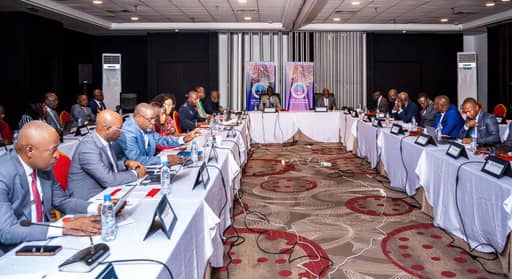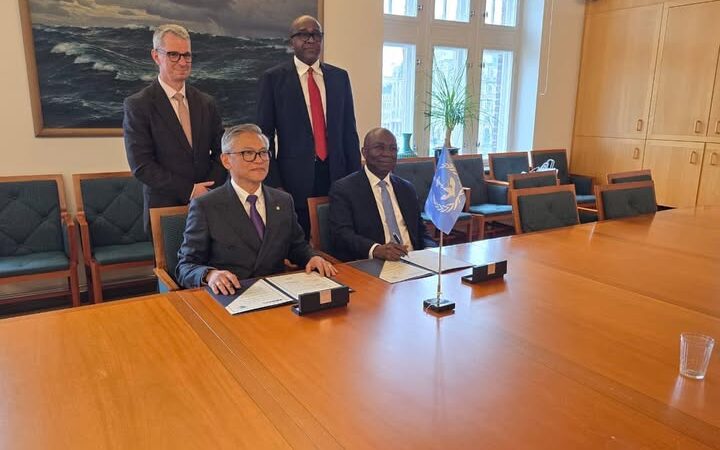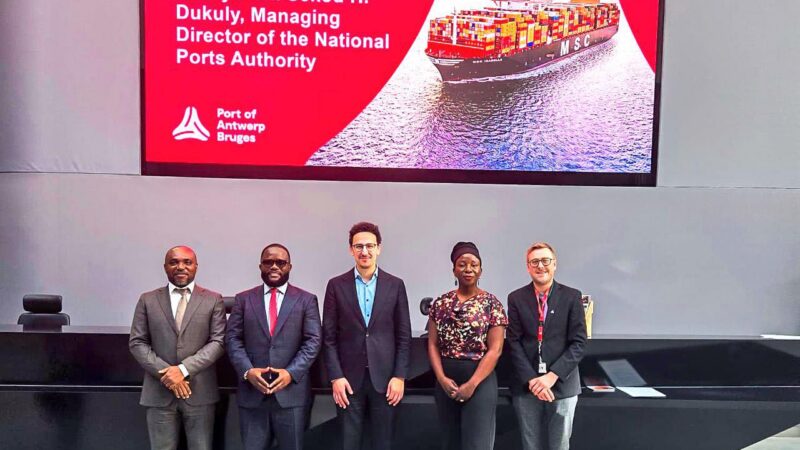The Port Autonome de Pointe-Noire is looking to new operating strategies to improve the port goods transit chain
 The members of the National Committee for the Facilitation and Simplification of Port Access from the Port Autonome de Pointe-Noire, customs, transit companies, trade unions, employers’ organisations and other public and private bodies met as a Steering Committee on Tuesday 16 July 2024 in Brazzaville, under the aegis of Séraphin BHALAT, Director General of the Port Autonome de Pointe-Noire and Chairman of the Committee, assisted by the Director General of Customs and Excise, who is Vice-Chairman.
The members of the National Committee for the Facilitation and Simplification of Port Access from the Port Autonome de Pointe-Noire, customs, transit companies, trade unions, employers’ organisations and other public and private bodies met as a Steering Committee on Tuesday 16 July 2024 in Brazzaville, under the aegis of Séraphin BHALAT, Director General of the Port Autonome de Pointe-Noire and Chairman of the Committee, assisted by the Director General of Customs and Excise, who is Vice-Chairman.
The aim of the meeting, attended by these public and private players whose actions have an impact on the port goods transit chain in terms of costs and timescales, was to take full stock of their collective responsibility and to assess the recurring under-performance noted in the goods clearance circuit.
According to Séraphin BHALAT, the various studies carried out to date have highlighted malfunctions in the port clearance chain, such as: the document bundle being weighed down by various formalities; the low level of digitisation of processes; the lack of operational coordination between players; the obsolescence of the regulatory framework for operations; the opacity of circuits generating unjustified cost centres. The abnormally high costs and delays resulting from these malfunctions, notwithstanding the modernisation of port, road and airport infrastructures, illustrate the ineffectiveness of the actions taken by the Steering Committee.

In order to find new strategies to improve the goods transit chain at the Port Autonome de Pointe-Noire in terms of costs and operational timescales, the members of the Steering Committee proposed a new approach that would make the goods delivery and customs clearance process more fluid. They also deemed it necessary to correct the administrative sluggishness associated with the high cost of all taxes, as well as the length of time taken to check and deliver goods through the port chain. It was observed that the competitiveness and efficiency of the port transit chain absolutely requires a global approach based on the convergence of objectives and the synergy of players.
At the end of this meeting, which according to Séraphin BHALAT marked a break with old habits and paved the way for a new dynamic, the players in the port transit chain, members of the Steering Committee, agreed to put in place an action plan to reduce port transit costs and times, which will be forwarded to the Government of the Republic. The nine-point plan aims to put in place a stable regulatory framework to ensure effective control of regulatory actions.
The Comité national de facilitation et de simplification du passage portuaire, chaired by the Prime Minister and Head of Government, was set up on 7 October 2019 to enhance the competitiveness of the Congolese transport chain, in particular by boosting its contribution to efforts to revive the national economy.
 By Antoine Dustell Mbama, Correspondent for Maritimafrica in the Republic of Congo
By Antoine Dustell Mbama, Correspondent for Maritimafrica in the Republic of Congo





